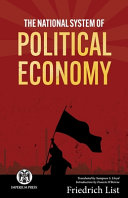

Most ebook files are in PDF format, so you can easily read them using various software such as Foxit Reader or directly on the Google Chrome browser.
Some ebook files are released by publishers in other formats such as .awz, .mobi, .epub, .fb2, etc. You may need to install specific software to read these formats on mobile/PC, such as Calibre.
Please read the tutorial at this link: https://ebookbell.com/faq
We offer FREE conversion to the popular formats you request; however, this may take some time. Therefore, right after payment, please email us, and we will try to provide the service as quickly as possible.
For some exceptional file formats or broken links (if any), please refrain from opening any disputes. Instead, email us first, and we will try to assist within a maximum of 6 hours.
EbookBell Team

4.1
40 reviewsFriedrich List is the father of economic nationalism and the historical school of economics. Responding to Adam Smith’s free market apologetics, in The National System of Political Economy List provides a theoretical basis for state intervention in the economy. But he does much more than this—as part of a wider trend in European thought, List affirms the primacy of history in developing our worldview. The National System of Political Economy does not begin with theory, but with history. In so doing, List shows that England’s rise as a commercial power was not facilitated by free markets but by protectionism, drawing his theory from historical fact rather than the other way around.
List’s avowed liberalism is overshadowed by his illiberal priors, and so the economic history of the 20th century was one of Listian principles being put to use by illiberal regimes such as Russia, China, and Germany. His thought also governed the economic policy of another developmental state for over a century—America.
Smith and Marx formed the basis of 20th century economic theory. But Friedrich List stands as a colossus astride the 20th century, forming the basis of economic practice for all major powers until mid-century. In his introduction to this edition, Francis O’Beirne shows that the great economic clash has never been between capitalism and socialism, but between capitalism and nationalism, with Marxism a revolutionary force, but an economic irrelevancy.